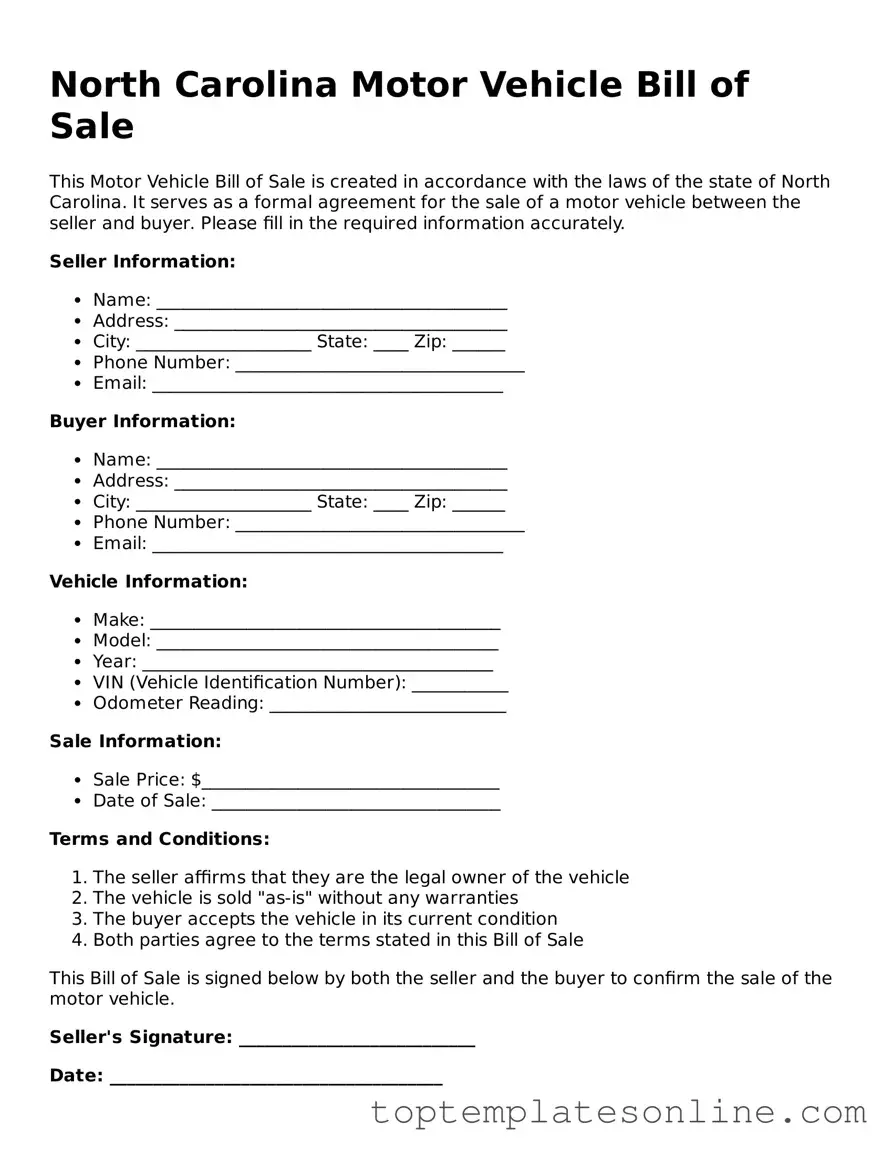Blank Motor Vehicle Bill of Sale Template for North Carolina State
When buying or selling a vehicle in North Carolina, a Motor Vehicle Bill of Sale form plays a crucial role in ensuring a smooth transaction. This document serves as a legal record of the transfer of ownership between the seller and the buyer. It typically includes essential details such as the names and addresses of both parties, the vehicle identification number (VIN), make, model, year, and the purchase price. Additionally, the form may outline any warranties or conditions related to the sale, providing clarity and protection for both parties involved. By documenting the transaction, the Bill of Sale not only helps in the registration process but also acts as proof of ownership in case of future disputes. Understanding the importance and components of this form can help individuals navigate the vehicle transfer process with confidence.
Some Other State-specific Motor Vehicle Bill of Sale Templates
Bill of Sale Michigan Vehicle - A document to transfer ownership of a vehicle from one party to another.
For individuals seeking to understand the nuances of transactions, the Alabama bill of sale template highlights critical aspects to ensure clarity and compliance in the exchange of ownership. You can access a customizable version of this document at this link.
Ohio Bmv Registration - Helps identify any liens on the vehicle prior to sale.
Common mistakes
-
Incomplete Information: Many individuals fail to provide all required details. Missing information such as the vehicle identification number (VIN), the make and model, or the sale price can lead to complications later.
-
Incorrect Signatures: It is essential that both the buyer and seller sign the document. Some people overlook this step or assume that only one signature is necessary, which can invalidate the sale.
-
Failure to Date the Form: Not including the date of the transaction can create confusion. Without a clear date, it may be difficult to establish when the ownership transfer occurred.
-
Not Keeping a Copy: After filling out the form, some individuals neglect to keep a copy for their records. This oversight can lead to disputes or issues if proof of the sale is needed in the future.
Guide to Writing North Carolina Motor Vehicle Bill of Sale
Once you have the North Carolina Motor Vehicle Bill of Sale form in hand, you are ready to complete it. This document is essential for recording the sale of a vehicle and ensuring that both the buyer and seller have a clear understanding of the transaction. Follow the steps below to accurately fill out the form.
- Obtain the Form: Download or print the North Carolina Motor Vehicle Bill of Sale form from the official state website or acquire a physical copy from a local DMV office.
- Seller Information: In the designated section, write the seller’s full name, address, and contact information. Ensure that all details are correct and legible.
- Buyer Information: Similarly, fill in the buyer’s full name, address, and contact information. Double-check for accuracy.
- Vehicle Details: Enter the vehicle's make, model, year, and Vehicle Identification Number (VIN). This information is crucial for identifying the vehicle involved in the sale.
- Sale Price: Clearly state the agreed-upon sale price for the vehicle. This amount should reflect what the buyer and seller have mutually agreed upon.
- Date of Sale: Write the date on which the sale is taking place. This date is important for both parties for record-keeping purposes.
- Signatures: Both the seller and buyer must sign and date the form to validate the transaction. Make sure that both signatures are clear.
After completing the form, both parties should keep a copy for their records. The buyer may need this document when registering the vehicle, while the seller should retain it as proof of the sale. Always ensure that any additional requirements or local regulations are also met during this process.
Documents used along the form
When completing a vehicle sale in North Carolina, several other forms and documents may be needed alongside the Motor Vehicle Bill of Sale. These documents help ensure that the transaction is legal, clear, and properly recorded. Below is a list of commonly used forms in conjunction with the Bill of Sale.
- North Carolina Title Application: This form is used to apply for a new title after the sale. It is essential for transferring ownership of the vehicle officially.
- Vehicle Title: The original title of the vehicle must be signed over to the new owner. This document proves ownership and is necessary for registration.
- Odometer Disclosure Statement: This form records the vehicle's mileage at the time of sale. It helps prevent fraud regarding the vehicle's true condition.
- Notice of Sale: This document notifies the North Carolina DMV that the vehicle has been sold. It helps protect the seller from liability for any future incidents involving the vehicle.
- Affidavit of Motor Vehicle Sale: This form may be used to declare the details of the sale, particularly if there are any discrepancies or issues with the transaction.
- Bill of Sale: This document serves as a crucial record in the transaction process, detailing the agreement between the buyer and seller. Ensure that the Bill of Sale is filled out appropriately to avoid any legal issues, and you can find a template at Legal PDF Documents.
- Sales Tax Form (MV-3): This form is used to report the sales tax on the vehicle sale. It is necessary for completing the registration process with the DMV.
Gathering these documents ensures a smooth and legal transaction. Always check with local regulations to confirm any additional requirements that may apply to your specific situation.
